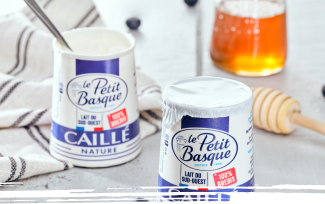Try sheep's milk
For centuries, milk has been an essential component of our daily diet. It boasts numerous nutritional qualities, making it a food consumed by young and old alike. Here you can discover its benefits and history and try using sheep’s milk in yogurts and your cooking!

Sheep’s milk : a long history
Sheep’s milk has been consumed for over 2,000 years and, during the Middle Ages, it was the most commonly consumed milk in France.
Around 7,000 BC, people discovered that sheep’s milk left too long in a container would curdle. This was likely the birth of the first dairy product, curd.
In more recent times, it is said that François I was treated for an intestinal ailment by a Turkish physician. Refusing to reveal his secret, the physician left without disclosing his remedy, which was, in fact, fermented sheep’s milk.
The benefits of Sheep's milk
The nutritional qualities of sheep’s milk make it a unique product. It is highly energizing, providing proteins and being a source of minerals such as calcium and phosphorus, as well as vitamins B2 and B12.
Both young and old appreciate its very mild, fresh, and slightly sweet taste.
Sheep’s milk is an ideal alternative for those with lactose intolerance.


Sheep's milk : ideal for all ages
Both young and old need calcium and minerals to maintain good health, and sheep’s milk is the perfect ally.
During childhood and adolescence, calcium and phosphorus are essential minerals for developing a strong skeleton.
During pregnancy and breastfeeding, the body has an increased need for calcium.
After the age of 50, the body requires more calcium to prevent bone fragility.
Regular and adequate vitamin D intake contributes to calcium absorption and ensures strong bones.
FAQ
Like all milk, sheep’s milk is essentially composed of water.
It’s composition is the following:
81% water
6.3% fat
5% proteins
5.3% carbohydrates
1% vitamins and minerals
187 mg/100g calcium
All our products (curds, yogurts, and desserts) are made from pasteurized sheep’s milk. This milk is collected from our local French farmers. Therefore, our products are suitable for everyone (children, pregnant women, adults, and seniors).
Sheep’s milk is :
A natural source of proteins.
Indeed, it contains an average of 5g per 100g of milk (10% of the Recommended Daily Allowance or RDA). These proteins are essential for forming and maintaining muscle, as well as for the body’s defences against external aggressions.
A source of calcium.
It contains on average of 187mg of calcium per 100g of milk, providing 23% of the RDA. Calcium plays a vital role in bone formation, maintenance, and renewal.
A source of vitamins.
Particularly vitamins B2 (21% of the RDA) and B12 (24% of the RDA). Vitamin B2 is essential for energy metabolism, and vitamin B12 helps you feel balanced and full of energy.
Sheep’s milk products can be an alternative for people with lactose intolerance to cow’s milk. Sheep’s milk is easier to digest because its fat globules are smaller. However, traces of lactic ferment grown in cow’s milk are present in very low quantities in our yogurts. We recommend consulting your doctor
We recommend starting your sheep’s milk experience with a yogurt that has a mild sheep taste and is flavoured. In the Douceurs de Brebis range, you can enjoy either the vanilla or lemon flavour.
Children can start consuming our products as early as 3 years old.
This helps diversify their diet and introduces new flavours.
Additionally, the unique taste of sheep’s milk contributes to the development of their palate.
Our products are available in all French stores.
If you are looking for a specific product, we invite you to click here :
Our sheep’s milk is 100% French and comes from farms located in the southwestern region of France.
We have our own sheep’s milk supply chain.
To learn more, click here:
The lactic ferments used in our yoghurts are cultured on a skimmed cow’s milk base. Currently, there are no lactic ferments with sheep’s milk.
All yogurts or fromage blancs on the market are made with this type of lactic ferment.
While cow’s milk is degraded by lactic cultures, it may still be present in trace amounts.
For reference, a 125g yogurt container contains less than 0.005g of lactic cultures (which may contain traces of cow’s milk).
If you or a family member has an allergy, we recommend consulting your doctor.
Yoghurt results from the fermentation of lactic ferment, resulting in a texture that can be firm or stirred with a slight acidity.
Curd, on the other hand, is rennet-set by adding a few drops of rennet and giving it a unique texture and a very mild, non-acidic taste.

Le Petit Basque
Find all the answers to the questions you have about Le Petit Basque: our history, our commitments, our advertisements...

The ewe sector
Discover the committed Le Petit Basque sector. Explore the history of our breeders, their daily lives and the lives of our sheep.

Our products
Discover sheep's milk, butter, yogurts and even sheep's desserts, a multitude of products to satisfy all taste buds.
